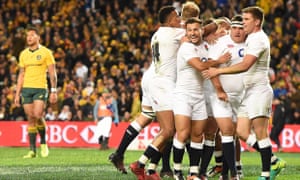On Friday 13 January, Ian Ritchie, the chief executive of the Rugby Football Union, met the press in the Members Lounge in the West Stand at Twickenham. Ritchie wanted in particular to talk about the three artificial grass pitches the RFU paid to have laid in Aylesbury, Preston, and Weston-super-Mare, the first of a hundred such around the country.
In the end he fielded questions about the negotiations over the new international calendar and whether the RFU wanted to reduce the number of games professionals are playing, concussion protocols; the injury to George North and the decision not to punish Northampton; tackle laws, and if the latest changes to them were going to lead to more red cards and cut down injuries; residency rules, and whether it should take longer to switch from one nationality to another. Every last little thing but those three new pitches.
After an hour of this, Ritchie made an appeal. “I think it is right to have these discussions, I get the significance of it,” he said, “but there is a bit of me that still wants to say: ‘By the way, let’s just look at where rugby is in 2017, and what we’ve got to look forward to, irrespective of laws and referees.’” It was, he explained, a question of perspective. The previous weekend he had been at the Ricoh Arena, one in a crowd of 28,000 watching Wasps’ win over Leicester, a game described as “a glimpse into the promised land”.
“I would say this, wouldn’t I?” Ritchie continued, “but the overall perspective is that the Six Nations is going to be a phenomenally exciting tournament, the Lions tour is going to be fantastic, the Premiership is in a really good place, and we’ve got more and more people wanting to play the game.
“So 2017,” Ritchie finished, “is going to be a fantastically exciting year.” And he is right. Two decades on from professionalism, elite rugby union is thriving. Premiership attendances are up this season and the average crowd is now just under 14,000. Harlequins’ match against Gloucester at Twickenham in December pulled in 77,000. On TV, the Premiership’s average audience is up by 13%, and more than one million tuned in for the first weekend of the season alone.

Globally, participation and revenue are down in Australia but the inclusion of sevens in the Olympic Games has spurred growth outside of the traditional Test nations. Japan are readying for the next World Cup and in China World Rugby recently entered into a partnership with the online retailer Alibaba, who will invest $100m over the next decade to launch professional men’s and women’s leagues and a national sevens programme.
Old salts say rugby has always been evolving. They point to changes in the scoring system, the decision to reward a try with five points rather than four, or the introduction of the sin-bin, or the experimental law variations, or, of course, the watershed moment when the sport turned professional, and offer these as proof of a sport in constant flux.
But it feels especially unsettled right now, as if rugby union is undergoing growing pains as it reaches maturity. At the weekend World Rugby hosted a meeting in San Francisco to sort out the shape of the international calendar. Back in England the clubs are pushing to cut the duration of the Six Nations from seven weeks to five, and the RFU is about to reveal its plans to revitalise championship rugby. A lot of different debates are taking place at once.
On the pitch, the Six Nations will feature its new bonus point system. According to the competition’s chief executive, John Feehan, this is an “idea they’ve been playing with for some time” and have waited so long to introduce because they were unsure about exactly what effect it would have. “The reality is the Six Nations is inherently unfair, in that three teams have two home games,” Feehan says. “On that basis, you could say this is adding another layer of unfairness.” They reached the decision that “the damage caused by the unfairness would be less than the positive of giving the teams encouragement to score more tries”.
Feehan mentions the final weekend of the 2015 tournament, when Ireland, Wales and England were all in contention for the Championship, and the six teams scored 27 tries between them. “Why?” asks Feehan, “because they had to go for it.”

“Defences have got better over the last number of years and bonus points is an incentive for people to break down defences. We don’t want a stodgy sport, where guys are going through the motions and the biggest guys win, that’s not what it’s about.”
Players and coaches seem split over whether or not bonus points will change the game. The Wales interim coach, Rob Howley, hopes they will have an impact in the final quarter. “Sides may have more of an intent to play,” he says. “There may be a mindset shift in the last 20 minutes if you find yourself in a bonus-point opportunity.”
Eddie Jones disagrees. “I’ve grown up with bonus points, I was coaching Super Rugby when they first came in. It’s always been the fact that if you play well you win, if you play really well you win with a bonus point. Simple as that.”
The England coach feels the stiffer penalties for head-high tackles will have a greater impact, at least until the players adjust. to them. “There’s going to be plenty of fun,” he says, it will be “14 versus 13” in some matches.
And that, he says, is where “the bonus points come in”. Jones supports the new, tougher, punishments. “We don’t want parents to worry about the safety of their kids, it’s about the future of the game.”
Feehan expects that, between these two changes, it is “inevitable” that there will be a slightly different style of rugby in this Six Nations. “But then if you go back 30 years and watch a game in the Six Nations it was a very different kind of game. Rugby develops like every other sport. This will tweak it, again. I think it will move people in a certain direction. It will probably lead to more running rugby.”
Guy Novès hopes so. “I played in the French team a long time ago,” the France coach says, “and I see the huge gap between what happened in 78, 79, 80 and what happens in 2017. It is a different game. We have seen every part of the game evolve. And every team, every coach, wants to carry on that evolution, so we can produce more spectacular games. That’s what will make young people want to play the game. And that’s our objective.”
Underlying all this, that uncertainty about exactly how rugby union should be played, and administered in the 21st century, as the players get fitter, faster, stronger, and the game grows bigger and more popular. Everyone agrees rugby union is changing but no one seems quite sure what it is growing into.



